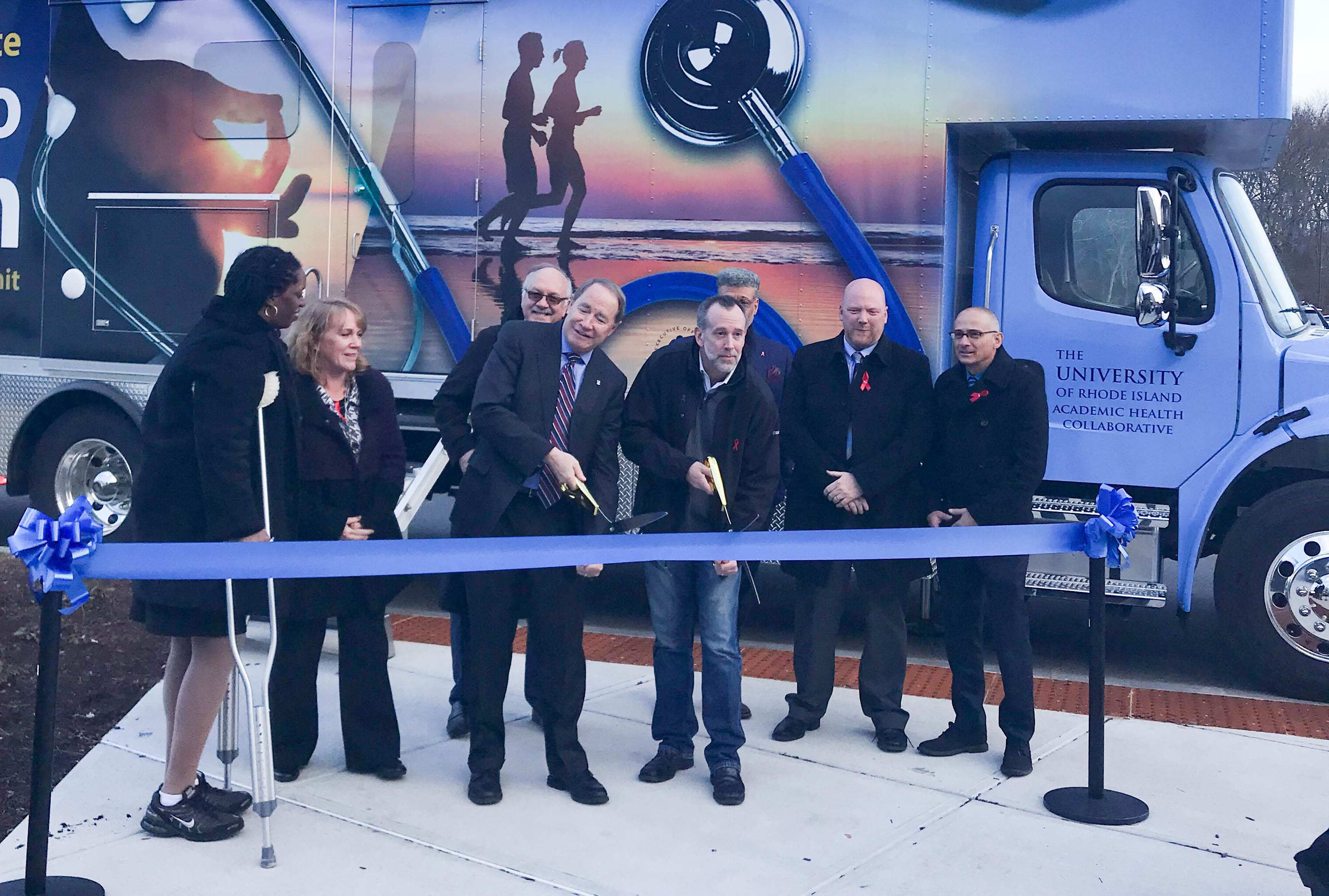Photo by Andrew Main | President David Dooley and Douglas Dusharm cut the ribbon to open up the new URI Health Mobile.
The ribbon-cutting ceremony for the Rhode to Health Mobile Unit was held yesterday at the Robert J. Higgins Welcome Center.
The Rhode to Health Mobile Unit is a 37-foot long van that will be used to travel the state to provide easy access for individuals who are at risk for HIV and AIDS. Donald H. DeHayes, the provost at the University of Rhode Island, told the audience that the new mobile unit will be a model for future healthcare access across the state.
“The URI Rhode to Health Integrated Health Mobile Unit is really a state-of-the-art mobile health facility,” DeHayes said. “There are very few like it, and certainly not in the state.”
Dr. Nicole Alexander-Scott, the director of the Rhode Island Department of Health, reiterated that the Mobile Health Unit will help to provide access to quality healthcare for individuals who need HIV and AIDS testing, treatment and care. Many of these individuals live in rural locations or areas with poor transportation, which makes access difficult.
“It gives us the opportunity to move from a particular health care setting out into the community,” Alexander-Scott said. “We know that is where we’re going to have our greatest impact. It is so exciting to have the University of Rhode Island be a leader and be a part of that type of movement and that type of shift in investments.”
Alexander-Scott said the Rhode Island Department of Health enjoyed working with URI to make the opening of the mobile unit possible.
“The Rhode Island Department of Health is excited to be joining our partners from the University of Rhode Island, along with the executive office of health and human services, to be able to add to the HIV prevention work that is so necessary across the state,” Alexander-Scott said.
Paul Loberti, director and founder of Rhode Island Centers of Excellence Integrating HIV Care, Support and Treatment, named a variety of people who can be helped by the Mobile Health Unit, including those without insurance, people who are underinsured, people who are not unaware of their status and people who are part of an at-risk group.
Loberti also praised URI for the role they took on with this project. “URI placed our most vulnerable populations first, and that’s so important today, when the opposite is happening, when vulnerable populations don’t have access to numerous resources,” Loberti said.
Douglas Dusharm, who is the secretary of the HIV Community Advisory Board and has AIDS, explained that the access the mobile health unit provides is crucial towards helping treat and fight the HIV and AIDS epidemic.
Dusharm explained that when he lived in New York, poor access to HIV treatment forced him to stop seeking treatment. This resulted in his HIV progressing to AIDS, which eventually led to him living with a friend in Rhode Island, where he was able to receive treatment. The mobile health unit will aim to reduce incidents similar to Dusharm’s experience with accessibility in New York.
Bryan Blissmer, a URI professor and director of the Institute for Integrated Health and Innovation, concluded the speaking portion of the ceremony by explaining that the mobile health unit exemplifies innovation. He said there is evidence that mobile health units can be more effective for HIV and AIDS treatment than traditional medical facilities.
“We really proposed an innovative model, as is being discussed today, where we would utilize a mobile health unit to deliver care when and where it would be most advantageous,” Blissmer said. “The clinic that we’re here today to roll out this afternoon is tangible evidence of that.”
Blissmer also said the mobile health unit is very important for the community involvement that URI is a part of. Blissmer said it is important to be active in the community and provide support for community members. He hopes the unit will help reach out to all underserved individuals in the state.
During the ceremony, Alexander-Scott presented URI a certificate of special recognition from Governor Gina Raimondo. The certificate commended the mobile health unit for serving vulnerable populations with limited HIV and AIDS healthcare access. URI President David Dooley accepted the certificate on the University’s behalf.





